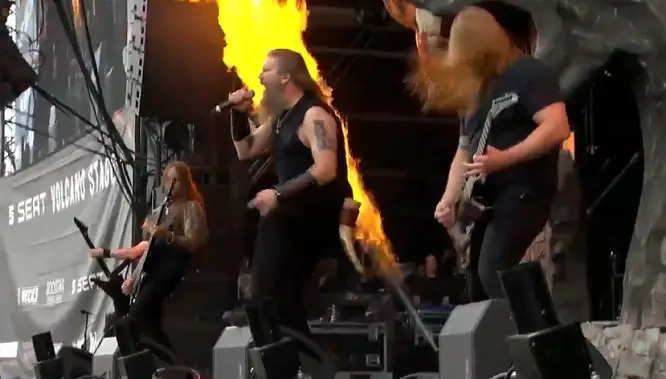
Amon Amarth’s vocalist Johan Hegg responded promptly to Loud TV interviewer if his band is surprised with the level of success they achieved:
“Yes and no. We’re not mainstream. They don’t play Amon Amarth on the radio. But it’s been such a slow and steady progress for us.
“We’ve been in this business for 25 years, and it’s been so gradual, you almost didn’t notice that you grew at first. It’s only the last couple of albums where it actually started growing quicker and quicker, but by then, you’re kind of expecting it.
“Not to say that you think you deserve to grow – it depends on what you produce, and you still have to put in the work. But it’s been growing faster and faster with each album, so it doesn’t really come as a surprise anymore when you do grow.
“But looking back, if somebody would have told me we would be here where we are now 10, 15 years ago, I wouldn’t have believed them. The first years were difficult. On the other hand, they were also simpler in some way, because now, the difficulty is that this is a huge apparatus.
“To make all the wheels of this thing work, you have to pay attention to everything. We’ve always been a band that’s very hands-on. We like to be in control of what’s going on. We don’t want to leave everything to anyone else. We want to be in charge.
“I also think that’s a major part of our success because that means we care about the business, we care about our business. It is a job, and you need to be on top of things. In a sense, in the beginning, you’re just happy if you could play for a case of beer. It’s changed slightly. [Laughs]
“It’s crazy to see those old photos and videos because it’s hard to even understand that it’s the same guy in those pictures. You hardly even recognize yourself…
“I’m not a very sentimental guy. I have a lot of photos and stuff, but I never look at them, so when I went back to revisit some of that stuff – and also, some of the places, like the youth club where we started out rehearsing – it was surprisingly emotional to be in that place, because it meant so much to us in the beginning. It’s weird to see all that stuff, but cool at the same time.”
On the difficult moments along the way:
“I have to say that most of the hard stuff in our career is nonsense, really. It feels hard at the time, but we’ve always helped each other through it, and when we go through it, we come out stronger in the other end, because we always learn from stuff like that.
“I would argue that the most difficult period was when Michael [Trengert] died. That was difficult because there was so much stuff we had planned with him that we wanted to do and how we wanted to make this band continue that we now had to scrap and kind of start over.
“We had to do that without him. He was such a driving force. That was difficult, and I think that took us a little bit of time. It took us hard when he disappeared, not only from a professional point of view but also as a friend.
“Otherwise, all these hard times have always been something that we’ve come out stronger from, and we learned from it and we moved on. I think that’s how any progress works, really. It’s the mistakes that make you stronger, not the success.
“I think Olavi [Mikkonen, guitar] says it really well in the documentary – he says, ‘Most of all, I still have passion for this.’ I think that goes for all of us. We love what we do, and we can’t think of anything we’d rather do for a living than this.
“We’re having the time of our lives, really. I think the past couple of years have probably been better than anything, really, so we’re in a really good spot right now.”